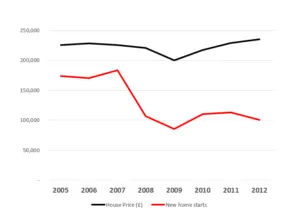Will Brexit hit house building?
Published: by Pete Jefferys
Nobody yet knows whether the decision to leave the EU will lead to an immediate downturn in the housing market. But you don’t have to look hard to see signs.
House builders’ share prices have been among the hardest hit, commercial property funds have suspended trading, REITS (investment products linked to property) are falling in value, housing associations have had credit ratings downgraded and forward indicators of construction activity have nosedived.
Equally importantly, there are signs that sentiment is shifting among home buyers and sellers. Newspapers are starting to run stories about asking prices being slashed. At this stage these reports are just anecdotes, but buyers will read them and think twice before making an offer.
We’ll need to wait weeks, if not months, to get a clear picture and it may be this is no more than a Brexit blip – but you’d be brave to bet that nothing will change. Parts of the housing market, especially London, were already looking highly overvalued compared to rents. Many analysts have been saying that a price fall is long overdue.
“So what?” you will surely be thinking. “Don’t we need a drop in house prices?”
Well, yes – but it is very important how this happens. It’s much less painful to climb steadily down a ladder than fall off it. The rollercoaster nature of our housing market has big knock-on impacts – especially on the critical issue of building more homes (including affordable ones).
There’s a smart piece of analysis [PDF] which shows a close relationship between the number of homes sold overall each year and the number of new homes built. Roughly, for every ten homes sold overall, one of them is a new build. A big drop in the number of overall sales translates into a big fall in housing construction.
This matters because:
- A lot of people are employed in the construction industry
- We have a massive housing shortage and can’t afford to build even fewer homes
- In particular we need genuinely affordable homes. Many of these are built by private developers, or by housing associations who have an increasingly market dependent building model. Affordable house building would be hit just as hard as market development.
In fact, we may end up with the worst of both worlds, as we did following the 2007 financial crisis. House prices won’t fall enough to make much difference to the bulk of people who are priced out, but they’ll fall sufficiently to cause a serious and long-lasting impact to house building. Between 2007 and 2009 house prices in England dipped about 10% but house building collapsed by over 50% (see below).
It’s not just the initial shock either. House building takes much longer to recover than it takes house prices to start inflating again. We’re still not building as many homes as we did in 2007, even though house prices are above their 2007 level – especially in London and the South East.
Small fall in prices, big fall in building[1]

So we shouldn’t be too quick to celebrate any Brexit house price dip, even if it does initially make home ownership seem closer for some.
The tough truth is that only way to long term affordability is to sort out the fundamentals in our housing market:
- Building as many homes as we need each year
- Building the right sort of homes, which people can afford to rent or buy
Sadly, if the signs are true and the housing market is about to take a hit these two simple goals will have got a bit harder.
We’ll be thinking about how to resolve this problem and actually take advantage of a market downturn in future blogs.
[1] ONS House Price Index and DCLG Live Table 244